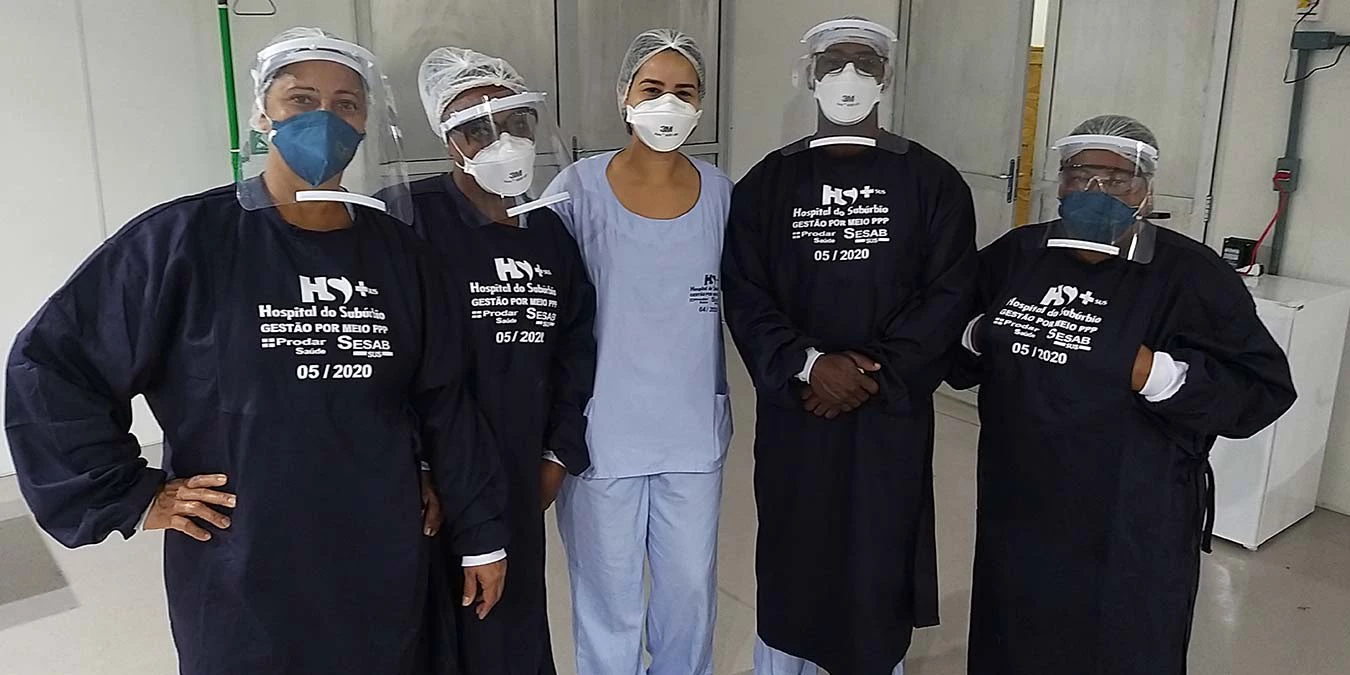By Patricia Bombonato de Carvalho
Denise was frightened when she was first hospitalized during a peak in the COVID-19 epidemic in Brazil last year. She found herself in the intensive care unit of Hospital do Subúrbio, in the city of Salvador, in the Bahia State, surrounded by intubated patients receiving supplemental oxygen.
“I was scared at first, but the care from the doctors and nurses made me feel better,” says Denise, who received quality medical treatment while staying in contact with her family through video calls arranged by hospital staff.
Recovering after ten days of treatment, Denise is one of hundreds of thousands of patients from one of Brazil’s most vulnerable regions who have benefitted over the past decade from Hospital do Subúrbio, the country’s first ever public-private partnership (PPP) hospital.
In 2010, the government of Bahia State and a consortium of private companies formed a 10-year partnership to build and operate a tertiary-care hospital in the city of Salvador focused on medium to high complexity cases in adults and children. From the start, Hospital do Subúrbio’s mission has been to provide quality healthcare for vulnerable patients. Some of the poorest regions in the country are located in Bahia State, with an estimated 40.3% of the population living below the World Bank Group’s poverty line, set at the equivalent of $1.90 a day. Before the PPP hospital’s construction, residents in the Salvador neighborhood it now serves had to travel some 22 kilometers to reach the nearest emergency care, facing critical delays and costly transportation.
Patients now have access to Hospital do Subúrbio’s extensive and highly specialized medical services, which are provided for free under the Sistema Único de Saúde (SUS), Brazil’s public healthcare system available to all citizens.

Medical staff review plans at Hospital do Subúrbio, created through a public-private partnership to provide quality health services in Salvador, Brazil. © Ascom HS
“The number one priority of all investment in social infrastructure is providing quality services to those who need them most,” says Karine Bachongy, the Health and Education lead for IFC’s PPP Transaction Advisory Services. “When well structured, private investment can effectively complement public sector strategies to support social infrastructure that improves health, safety, and development.”
IFC advised the state government on the structuring of the hospital’s initial PPP tender with financial support from PSPInfra, a facility created by the Inter-American Development Bank, the Brazilian Development Bank, and IFC to improve public services in Brazil through the development of infrastructure projects with the participation of the private sector. The hospital was developed by the Promedica & Dalkia consortium (Prodal), composed of a leading Brazilian healthcare company and a French firm specializing in facility management. The partnership contract was extended in 2020 as the hospital works to combat the COVID-19 pandemic.
Last May, the hospital inaugurated a field facility that was constructed in less than two months in a former parking lot. The new annex had the capacity to treat 60 COVID patients simultaneously, while a reorganization of the main hospital created 118 additional intensive care beds exclusively for severe COVID cases. An additional 110 doctors were hired, along with 496 non-medical staff, to provide expanded care and ensure safety protocols.
“We had this extra challenge at the hospital — while still maintaining regular care in other areas, such as surgeries, neurosurgery, and pediatric trauma,” says Dr. Rogério Palmeira, Hospital do Subúrbio technical director. “We created two hospitals in one space: A hospital focused on COVID, with different protocols and separate access from the other part of the hospital.” The temporary pandemic facility was closed at the end of August 2021 as the number of cases eased.
The successful public-private partnership is continuing to serve as a model for expanding quality services to the poor. The government pays fees to the hospital’s private operator that are linked to quantitative and qualitative performance targets.
“Success builds upon success,” says IFC Investment Officer Tomas Anker in São Paulo. “Brazilian officials who played a role in establishing the Hospital do Subúrbio gained a deep understanding that led to subsequent partnerships within the health sector.”
For example, the state government of Bahia subsequently signed an 11.5-year concession with a consortia of private companies to build, operate, and maintain medical imaging units in 12 hospitals, along with the construction of a new diagnostic center. IFC advised the structuring of the project, which is providing critical imaging and telemedicine services - including radiology, mammography, and hemodynamics - through the State healthcare system. Just recently, the project reached a milestone of two million exams provided to the people of Bahia.
Hospital do Subúrbio has also set a good example for public-private partnerships in sectors beyond healthcare. Brazil is increasingly turning to PPPs to improve infrastructure and services across sectors such as transport and public street lighting. “Now, we are seeing a myriad of public-private infrastructure projects in several sectors that are promoting development throughout the country,” says Anker.
As for Denise, she rests assured that she has access to quality healthcare nearby whenever she needs it. “I was so pleased with the treatment,” she says. “I am grateful to everyone.”
Note: The patient´s name in the story have been changed to protect her anonymity.
Bruna Monteiro Sandrini contributed to this report.
Published in December 2021
